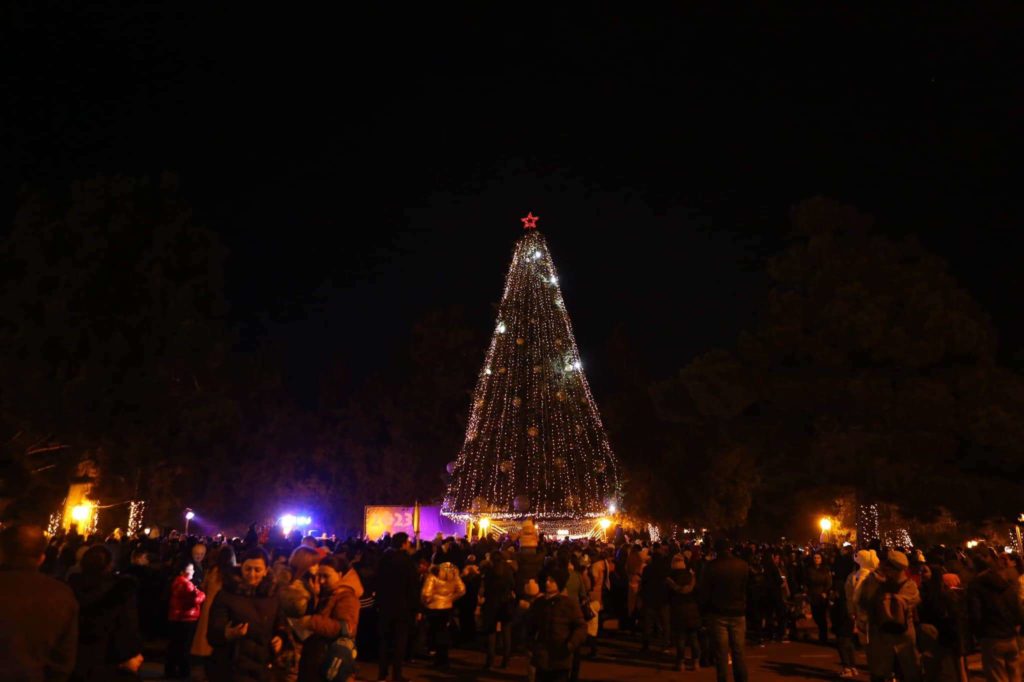
The Armenian Orthodox Church celebrates Christmas on 6th January. As the world’s oldest Christian nation, the spirit of Christmas runs deep in Armenian culture.
But holiday festivities in the Artsakh region will be curtailed this year due to the blockade of the Lachin Corridor, the only road connecting the Artsakh region to the world. Over 120,000 Armenians (including 30,000 children) depend on daily imports of 400 tons of food and medicine. Local officials are warning of a humanitarian disaster as they implement price controls and ration remaining goods.
Christmas is a time for sharing. The blockade in Artsakh means the act of sharing is understood in the most literal sense, given the shortage of food, medicine, fuel and other vital goods.
Pope Francis’ has called on all parties involved in the conflict to find “peaceful solutions to the dispute “for the good of the people.”
He expressed concern about the situation in the region and in particular “about the precarious humanitarian conditions of the people, which are in further danger of deteriorating during the winter season”.
A significant number of people from this region have made their home in Australia, and will feel distress and anguish about this situation. Let us join in prayer for peace and the end of the blockade.
The World Council of Churches (WCC) and the Conference of European Churches (CEC), have urged the European Union to pursue all possible diplomatic initiatives to ensure that Azerbaijan re-opens the Lachin Corridor and provides appropriate guarantees that it will remain open. The corridor – the only road connecting Artsakh/Nagorno-Karabakh to Armenia – has reportedly been blocked by Azeri forces since 12 December, completely isolating around 120,000 ethnic Armenians living in the enclave, and depriving them of food, medicines and other basic necessities, as well as gas supplies.
In a joint letter in December to the High Representative for Foreign Affairs and Security Policy (European Union), they wrote:
The World Council of Churches and the Conference of European Churches denounces the blockade by Azerbaijan of Artsakh/Nagorno-Karabakh, as a violation of the tripartite agreement that ended the six-week war of 2020, of international humanitarian and human rights law, and of the most fundamental moral principles. By its actions in obstructing the humanitarian Lachin corridor, and by temporarily cutting gas supplies to the region just at the onset of winter, Azerbaijan is deliberately creating a humanitarian emergency for the 120,000 ethnic Armenian residents of Artsakh/Nagorno-Karabakh, seeking to force Armenia into accepting a settlement on Azerbaijan’s terms, and trying to terrorize ethnic Armenians into abandoning their ancient homeland.
This follows a clear pattern of behaviour by Azerbaijan that contradicts any claims of goodwill and humanitarian responsibility on its part. Increasing Azerbaijani attacks on sovereign Armenian territory prompted the UN Security Council to call an emergency meeting on 15 September 2022. Growing evidence of gross violations of human rights against Armenians by Azerbaijan’s military and security forces compelled Human Rights Watch to accuse Baku of war crimes. Accountability for such crimes and violations has not been pursued. Moreover, Armenian religious and cultural heritage in the region remain largely unmonitored, unprotected and at risk.
In these circumstances, Armenian fears of renewed genocide against them cannot be discounted, and the blockade of Artsakh/Nagorno-Karabakh is a context in which those fears are greatly and understandably exacerbated.
We therefore write to urge you to pursue all possible diplomatic initiatives to ensure that Azerbaijan re-opens the Lachin corridor and provides appropriate guarantees that it will remain open. Further, we appeal to you to do all in your power to secure extension of the mandate of the existing EU monitoring mission at the Armenia-Azerbaijan border to include the Lachin corridor, in order to provide independent civilian monitoring of the situation along the corridor.
We look forward to your response, and to your swift action to address these urgent humanitarian and human rights concerns.
Yours sincerely,
Rev. Prof. Dr Ioan Sauca
Acting General Secretary
World Council of Churches
Dr Jørgen Skov Sørensen
General Secretary
Conference of European Churches
The UN Security Council has urged an end to the blockade of the Lachin Corridor. Russia, a permanent member of the Council, said that it anticipates the opening of the Corridor in the near future. Its peacekeeping forces reportedly have been engaged in negotiations with the Azerbaijani side.
During a 44-day war with 6,500 casualties in 2020, Azerbaijan recaptured three-quarters of its internationally recognized sovereign territory, before Russia engineered a ceasefire. The indigenous Armenian inhabitants controlled the enclave for the previous 30 years, claiming the right of self-determination in an unrecognized 1991 independence referendum.